by Arutz 7 Staff
May 1, 2019
Original Arutz 7 article posted at:
http://bit.ly/stories-of-the-2019-holocaust-memorial-torchlighters
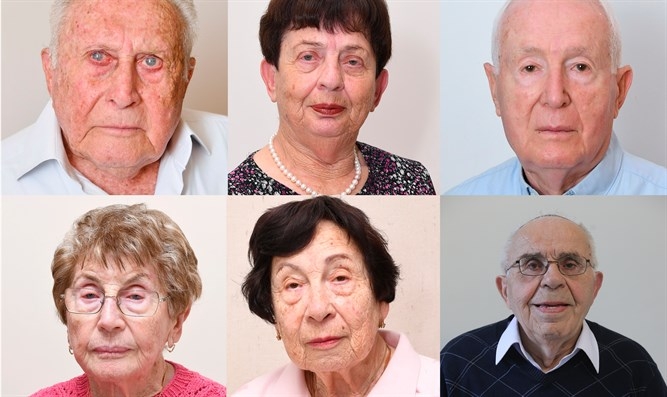
2019 Holocaust memorial torchlighters(Photo: Yisrael Harari and Isaac Harari)
During the official Holocaust Memorial ceremony which will take place Wednesday evening at Yad Vashem, six Holocaust survivors will light six torches. The survivors are Bela Eizenman, Shaul Lubovitz, Fanny Ben-Ami, Menachem Haberman, Sara Shapira and Yehuda Mimon. Holocaust survivor Zipora (Feiga) Granat (née Gershenfish) will speak on behalf of the survivors.
Here are their stories.
Bela Eizenman was born in 1927 in Lodz, Poland, to Moshe and Hinda Federman. When the Germans occupied Poland in September 1939, the goods in her father's shop were requisitioned. A year later, the family was imprisoned in the Lodz ghetto. Thirteen people were crowded into their ghetto home. In May 1942, Moshe was interrogated at the German police headquarters, across from their house. Bela could hear his screams. Moshe succumbed to his injuries a few days later, and was buried in a mass grave.
Bela was put to work sewing and crocheting - including uniforms for German soldiers - filling her mother's quota as well so that they could get more ration cards. In March 1943, German troops broke into Bela's home and beat her eldest brother Chaim, who was lying down and visibly starving. When Bela and Hinda came back from work, they found him dying. "Tomorrow is the first day of spring, but I won't live to see it," he said. He died the next day.
Despite their work sewing uniforms, in the summer of 1944, Bela and Hinda were deported to Auschwitz. While on the ramp, Hinda told Bela to wear her coat so that she would look older. Hinda was murdered in the gas chambers. Bela, the last surviving member of her family, became sick and was destined for the gas chambers too, but a train to Bergen-Belsen was missing a female prisoner and Bela was sent in her place.
After reaching Hanover, Bela was carried to Bergen-Belsen by several women. She worked in a factory in Rochlitz, and in March 1945, she was sent on a death march with other prisoners. The women survived on snow and frozen potatoes. One night, Bela and three of her friends hid in the hay in a barn. The Germans poked the hay with their bayonets, but did not discover them. When the column of the death march vanished, they fled to the forest, getting caught in a snowstorm. Bela ultimately reached a Czech village, where she was liberated by the US Army.
Bela joined a group of Jewish orphans who sought to immigrate to Eretz Israel with the help of the "Youth Aliya" movement – thus fulfilling her late brother's dream. During Bela's journey to Eretz Israel she stayed in refugee camps in Italy, where she learned Hebrew. She also met Zvi Eizenman, also a Holocaust survivor, and they later married.
In August 1946, Bela and Zvi boarded the illegal immigrant ship Katriel Yaffe. The British seized the ship and took its passengers into custody in Cyprus and Atlit for six months. In Israel, Bela completed her schooling, studied nursing, and later joined the IDF as a registered nurse. She served as head nurse in a hospital and later in the public health service.
Bela and her husband Zvi z"l have two children, eight grandchildren and eight great-grandchildren.
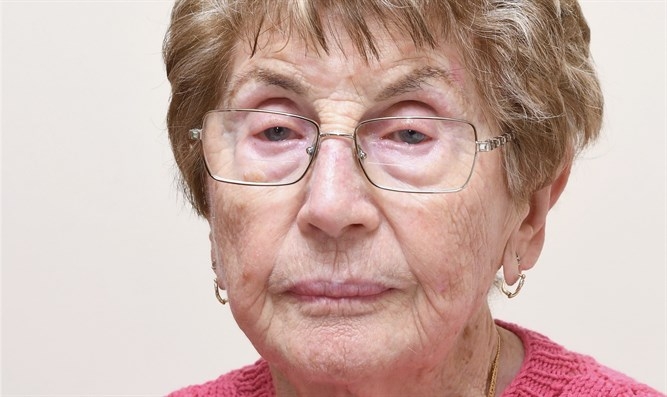
Bela Eizenman (photo credit: Isaac Harari/Yad Vashem)
Fanny Ben-Ami was born in 1930 in Baden-Baden, Germany, to Hirsch and Yohanna-Hannah Eyal. When Hitler rose to power, her family fled to Paris. The couple had two other daughters, Erica and Georgette, and five-year-old Fanny babysat her little sisters when her parents went out to work.
When WWII broke out in September 1939, Hirsch was imprisoned. Following the German occupation in May 1940, Fanny and her sisters were sent to the Château de Chaumont with the help of the OSE, an organization that rendered aid to Jewish children. Fanny served as a maternal figure to her little sisters, as well as to other children in the home.
In July 1942, the children in the orphanage were scattered due to an informant. In the spring of 1943, Fanny went to Lyon to visit her mother, and found out that she had been imprisoned. Fanny went to the jailhouse and told the wardens, "Let my mother out. She didn't steal anything or murder anyone. There's no reason for her to be here." The jailers threatened to imprison her too, but Fanny answered, "Do it, my parents are in jail anyway. You're not real Frenchmen, you're traitors. You know what happens to traitors!" The jailers were amazed at her courage and released her mother.
The OSE transferred Fanny and her aunt to the Alps, where Fanny began to aid the resistance. After eavesdropping on a local businessman's phone call, she warned them about a raid the Germans were planning.
When the OSE decided to smuggle Fanny and a group of children into Switzerland, her mother took her to the bus and said, "Who knows if we'll see each other again?" They never did. A seventeen-year-old was leading the group of children. When the group got close to the border zone, the teenager panicked at the massive German presence in the area and refused to go on. For lack of an alternative, Fanny took command and smuggled the children in a postal train to Annemasse. From there, they tried to reach the border in trucks, but they were caught by French gendarmes on patrol. The children were interrogated and imprisoned, but Fanny managed to get them out through a bathroom window. Once outside, Fanny ordered the children to march while singing, as if they were on vacation, so as not to draw suspicion. The group escaped to the forest and Fanny managed to smuggle them into Switzerland.
After the war, Fanny found out that her parents had been murdered, and returned to France with her sisters. When she petitioned the municipality for French citizenship, Fanny met a resistance fighter whom she knew. "Fanny saved 150 people," he told the officials. "She will not pay for citizenship. She will receive it with honor." Fanny was awarded the French Legion of Honor for her work in the resistance, but she declined to accept it.
Fanny immigrated to Israel in 1956. She and her husband Benyamin z"l have two children and six grandchildren.
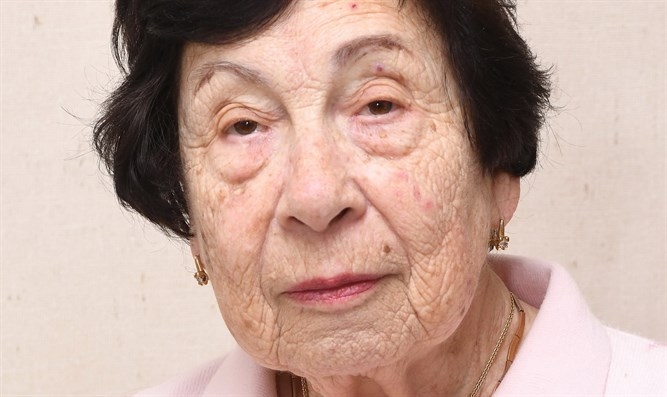
Fanny Ben-Ami (photo credit: Isaac Harari/Yad Vashem)
Menachem Haberman was born in 1927 in the city of Orlová, Czechoslovakia, but grew up in Munkács. He was the second of eight children. His Hasidic parents Yehuda-Laib and Rachel Haberman owned a dairy factory, and during his childhood, he helped deliver products to their customers.
Towards the end of 1938, Yehuda-Laib was drafted into the Czechoslovakian army and Menachem dropped out of school to take his place in the factory. Following the Munich conference, Munkács and its environs were annexed to Hungary. In the spring of 1940, Menachem's father was taken into the Hungarian army's labor service, and sent to the eastern front. On the eve of Menachem's bar mitzvah, Hungarian troops committed a pogrom near the synagogue, killing three worshippers.
In the spring of 1944, the Germans established a ghetto in Munkács. Twenty-one family members were cramped into a two-room apartment, where they experienced scarcity and hunger. Menachem and his friends were pressed into forced labor.
In May 1944, the Jews in the Munkács ghetto were deported to Auschwitz. During the selektion, Menachem was separated from his younger brother Benjamin, who was sent to the gas chambers with his mother and five of his siblings. His older sister later succumbed to illness, leaving Menachem as the last member of his family. He was put to work removing ashes from the crematoria, gathering excrement for fertilizer, and harvesting grains. Over time, he proved to be a skilled horse groomer, and he would carry equipment and horse feed around Auschwitz-Birkenau. Thanks to the food that he chanced upon along during his work, he managed to survive, although many times he was just a step away from death. He escaped the jaws of a dog that threatened to attack him; an SS officer nearly executed him after catching him with food in his bag; and he fell and nearly drowned in a pool of human ash from the crematoria.
In January 1945, Menachem was sent with the rest of the prisoners of Auschwitz on a death march, during which many of his friends died. The survivors were then put on open train cars and sent west. Airplanes bombed the convoy during the trip. Menachem was wounded and pulled a piece of shrapnel out of his own shoulder.
After a five-day journey, the train reached Buchenwald. Of the 150 prisoners who had been put in Menachem's car, 20 were still alive. Menachem stayed in the children's block in Buchenwald in dire conditions filled with disease and lice, overcrowding and hunger. When Buchenwald was evacuated early in April 1945, he hid in a sewage pipe. He was caught five days later and sent on a death march, but he ran away and returned to the camp. When the US Army liberated the camp the next day, Menachem weighed 34 kilograms (75 pounds).
After recuperating in Switzerland, Menachem founded a cooperative with his friends, buying equipment for a workshop for typewriters and adding machines. When he found out that his father had survived and was living in the Soviet Union, Yehuda-Laib wrote him, "If you go to Eretz Israel, there is a chance that we will meet.” Menachem immigrated to Israel in 1950, bringing the equipment with him and opening a workshop in Jerusalem. Eventually, he managed to get his father out of the USSR to Israel.
Menachem married Rivka, a Holocaust survivor from the Netherlands. They have three children and five grandchildren.
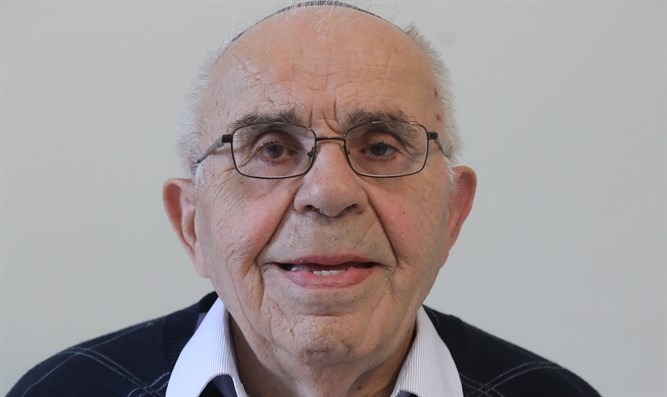
Menachem Haberman (photo credit: Isaac Harari/Yad Vashem)
Sara Shapira (née Zeidner) was born in 1933 in the city of Rădăuți in Romanian Bukovina. She was the youngest of five children in a Vizhnitzer Hasidic family. In 1937, her father Shmuel died prematurely, and her maternal uncle Itzik took the family under his protection. The USSR occupied Czernowitz in 1940, and Sara’s mother Taube took her brother’s advice and sent two of her sons and one daughter there. Taube herself stayed at home with Sara and her older sister Bina.
In late 1941, after the Jewish holiday of Simchat Torah, the Romanians deported the Jews of Rădăuți to Transnistria. The deportees were crammed into freight trains and sent to the town of Otaci, located on the banks of the Dniester. During the long journey, many passengers died from the overcrowding, hunger and thirst. They were then put on rafts on the banks of the Dniester. Some of them, including Sara’s grandmother Malka, fell into the river and drowned. The survivors were transferred to Mogilev, and then marched to Kuzmintsy, a village further north. There they were concentrated in a stable without food or water, and in poor sanitary conditions. Her sister Bina and uncle Itzik died from a typhus epidemic, and her mother Taube died soon after. “At night I slept next to my mother, embracing her,” recalls Sara. “One morning, I realized that my mother had passed away in the night. I didn’t know in the night that she was already gone. I was alone. A nine-year-old girl.”
Sara was transferred to a Jewish orphanage in Mogilev, where she lived in constant hunger. She didn’t get to bathe, and her head was swarming with lice. She had one dress for winter and summer. Because beds were in short supply, the children slept on them horizontally. Sara lived that way for two years.
In March 1944, the authorities decided to return some 4,000 Jewish children -“the orphans of Transnistria”- to Romania. Sara was sent to an orphanage in Falticeni, where she bathed and put on new clothes for the first time in years. She was a guest for Passover at the home of the Zeidman family, who offered to adopt her. Sara agreed, but shortly thereafter she found out by chance that her sister Adina and her brother Zalman were still alive. Sara found Adina and they returned to Rădăuți together. “The non-Jewish neighbors agreed to give Adina one napkin that our mother had woven,” said Sara. “That’s the only memento I have from my mother.”
Sara moved to Bucharest and lived for two years in a Jewish orphanage, where she learned Hebrew and prepared to immigrate to Eretz Israel. In September 1947, she boarded The Jewish State, and after spending four months in British internment camps in Cyprus, she reached Eretz Israel.
Sara married Meir Shapira, a fellow Holocaust survivor, and raised an Orthodox Zionist family.
Sara and Meir z”l have three children, 16 grandchildren and 19 great-grandchildren.
Sara’s son, Rabbi Elimelech Shapira, was a founder of the Eretz Hatzvi pre-military academy in Peduel. In 2002, Elimelech was killed by terrprosts in a shooting attack while on his way to study Torah with his learning partner in Bnei Brak.
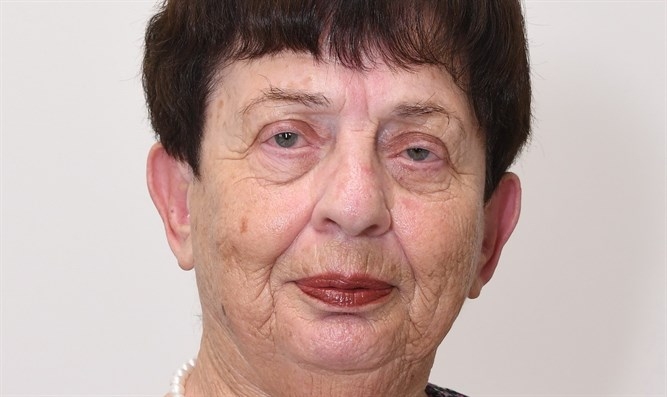
Sara Shapira (photo credit: Isaac Harari/Yad Vashem)
Shaul Lubovitz (né Blacher) was born in 1934 in Braslav (today in Belarus). His father Yitzhak was a cattle trader and his mother Batya was a bank clerk. Shaul had a younger sister, Bluma.
In the summer of 1941, a few weeks after the German occupation, Yitzhak was murdered while performing forced labor. When the Jews were concentrated in the ghetto in April 1942, Shaul’s family had to move into his grandfather’s house with other families. The day the ghetto was liquidated, his family, acquaintances and neighbors went into a hiding place under the barn.
The Germans uncovered their hideout a few days later, and brought them to a school. Shaul’s uncle Zusman managed to bribe one of the guards to let the family get away. Batya decided to stay with her three-year-old daughter. “She didn’t want to keep living after my father died,” said Shaul. His aunt Hannah and her husband Zusman fled with eight-year-old Shaul, their five-year-old son Arye, and another family, leaving their three-year-old son Moshe behind. As they escaped, Shaul heard gunfire and realized that his mother, Bluma and Moshe had been murdered. “I understood that I was now alone in the world.”
The refugees were aided by Stanisław Szakel, a local farmer, who hid them in his pigpen. When their presence began to put him in danger, they chose to leave. They roamed around for six months, sleeping in fields, ditches and bushes. Shaul was injured and filthy, and his head was covered with lice. Zusman went from village to village in search of bread for the family. The four finally found a granary and hid in the hay. The owner discovered them a few months later, but Zusman bribed him not to turn them in and went to look for partisans. Hannah and the two children stayed hidden until Szakel found them and brought them back to his farm. Szakel was eventually recognized as a Righteous Among the Nations. Zusman came back and took the family to a group of partisans in the forest. “We lived in a temporary shelter called a zemlianka,” said Shaul. “There were other families with children. There was a sense of security. Food wasn’t scarce there.”
When Braslav was liberated in July 1944, Shaul and his uncle’s family returned to the city, which was under Soviet control. He started school, but antisemitism quickly led the family to flee. First, they fled to Poland, and then headed to Germany. They stayed in DP camps, including Eschwege and Bergen-Belsen, before moving to France. The family reached Israel in 1949 and Shaul adopted his aunt and uncle’s surname - Lubovitz.
Shaul married Nechama, who was killed in a suicide bombing on a bus in Ramat Gan in 1995.
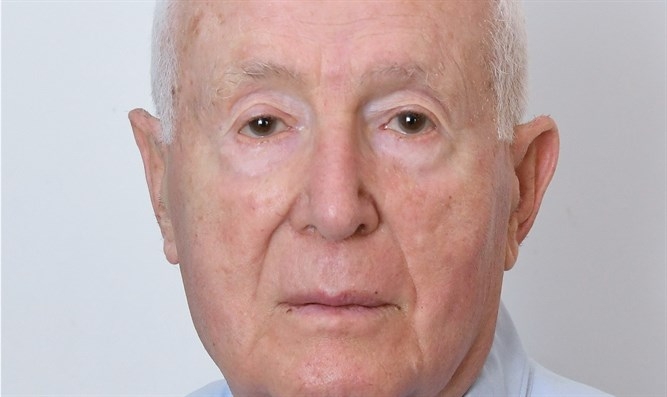
Shaul Lubovitz (photo credit: Isaac Harari/Yad Vashem)
Yehuda Mimon (né Waserman) was born in Krakow, Poland, in 1924. His parents, Sara and Meir, had an older son named Moshe. Yehuda went to the Jewish school and the Hebrew Gymnasium in Krakow, where he was a member of a Zionist youth group.
Late in 1939, some two months after the Germans occupied Krakow, the city’s Jewish schools were closed and formal Jewish education went underground. The children, including Yehuda, were divided into groups of five pupils each and the teachers visited the groups house by house. The youth groups went underground too, teaching them to immigrate to Eretz Israel and holding social events.
In March 1940, Yehuda joined the Akiva youth group and kept up his activities even after the Krakow ghetto was established in March 1941. In the summer of 1942, he joined the pioneer underground group Hehalutz Halohem (The Fighting Pioneer). He was in charge of signaling for the command center, and he performed various missions on the orders of Aharon "Dolek" Liebeskind and Shimshon Draenger. The dangerous actions that he carried out included sneaking Hehalutz Halohem operatives into the ghetto.Yehuda’s mother and brother were transferred to the Plaszow labor camp, where Sara was murdered. Yehuda's father was murdered at Belzec.
On 22 December 1942, Yehuda and other resistance members received orders to aid in an assault on the Cyganeria café in Krakow, where German soldiers gathered. German soldiers and officers were killed in the attack, which reverberated throughout Poland.
During another bold operation, the Germans arrested Yehuda. He was imprisoned and deported to Auschwitz in April 1943. There, he labored in a workshop and joined the camp's communist underground. In 1996, the President of Poland awarded him the honorary Auschwitz Cross for his resistance activity in Auschwitz.
On 18 January 1945, Yehuda and five of his comrades escaped the death march from Auschwitz and went into hiding until they were liberated. He returned to Krakow thereafter, and became active in the Bericha organization, which smuggled Jewish refugees into Eretz Israel. In June 1946, Yehuda immigrated to Eretz Israel with Aviva Lieberman, whom he later married, aboard the Josiah Wedgwood. He served in the Israel Navy after the state became independent.
In 1963, Yehuda was sent to Poland as First Secretary of the Israeli embassy in Warsaw, and in 1968 he was reassigned to Vienna as special envoy for Polish and Soviet Jews who wanted to immigrate to Israel. While serving abroad, he adopted the Hebrew surname Mimon. In 1972, Yehuda completed his military service with the rank of lieutenant colonel, and he opened a chip processing plant in the Haifa Bay after he was discharged. In 1995, he was honored by the city of Haifa. Yehuda and Aviva have two children, seven grandchildren and two great-grandchildren.
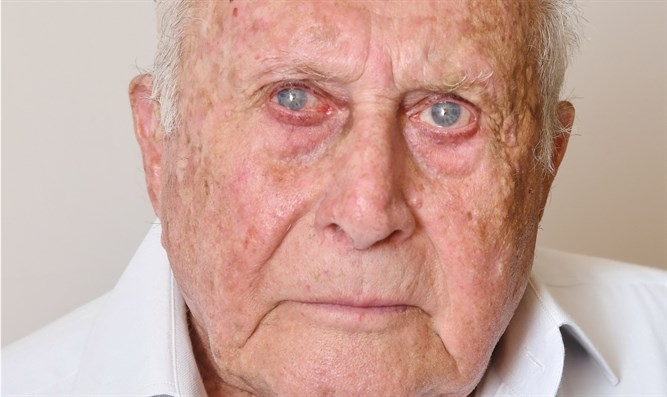
Yehuda Mimon (photo credit: Isaac Harari/Yad Vashem)
Zipora (Feiga) Granat (née Gershenfish) was born in 1931 in the city of Belfort, France, to Polish immigrants Chaya and Jacob. The couple had another daughter and two sons. Her family was Orthodox, and Zipora attended non-Jewish private schools.
After Germany occupied France, Zipora's parents made contact with women from the Salvation Army who took care of the children of Jews who had been arrested, and Chaya begun helping them with their activities. Chaya was arrested, but before she was taken away, she told Zipora her last will and testament and gave her her wedding ring. Jacob asked the French police to take him instead of his wife, but they refused. He demanded that the entire family accompany her, but the police refused that, too. Shortly after Zipora visited her mother in custody, Chaya was deported to the Pithiviers concentration camp, and from there to Auschwitz.
The Salvation Army women arranged to have Zipora and her sister Simone sent to a girls' boarding school in a nearby city. Their father took them there, and they said a hasty goodbye. Zipora wrote letters to her father, but she got no response. She eventually found out that he had been sent to Drancy, and from there to Auschwitz.
The Salvation Army women took Zipora's brothers into their homes, and later the boys were transferred to a Jewish orphanage in Paris. When the principal of the boarding school found out that Zipora had asked the Gestapo to allow her to reunite with her brothers, she hurriedly sent her and Simone to a safer place in a different city. The antisemitic principal of their school hounded them. One of the women from the Salvation Army moved to the city to offer Zipora and her sister some relief. Her older brother Samuel was hidden in the French Alps, and her younger brother Joseph was murdered in the Holocaust.
After being liberated in June 1944, Zipora met Jewish-American soldiers in the city's synagogue, and they helped her reunite with Samuel. Zipora, Samuel and Simone moved to Switzerland, where her uncle lived, and Zipora corresponded with her aunt in Canada. She offered to take in the three children, but after a prolonged correspondence, Zipora decided to immigrate to Eretz Israel, the goal she had set for herself.
During Passover 1946, Zipora and her siblings moved to Eretz Israel. Zipora served in the Haganah and the Israel Navy, and then taught in primary schools in Haifa. She later joined the Yemin Orde boarding school, where she worked with young immigrants, particularly from the Former Soviet Union.
Zipora tells her life’s story and is active in Aloumim, an organization of children who were hidden in France during the Holocaust.
Zipora and her husband Avraham z"l have three children, ten grandchildren and 21 great-grandchildren.
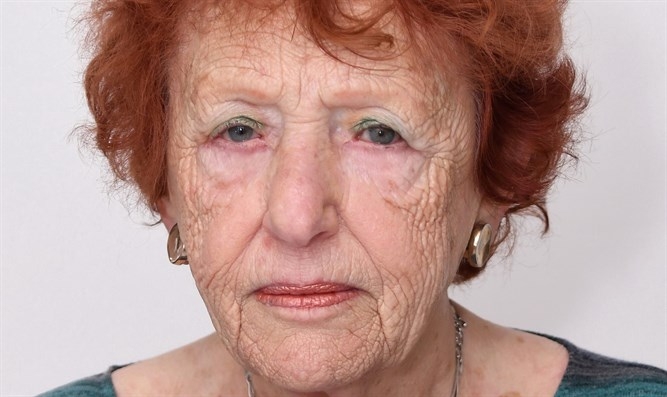
Zipora (Feiga) Granat (photo credit: Isaac Harari/Yad Vashem)
 Return to Life in Israel Articles
Return to Life in Israel Articles Return to Only in Israel
Return to Only in Israel